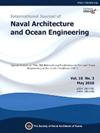基于约束规划和离散事件仿真的船体分段装配线调度优化
IF 3.9
3区 工程技术
Q2 ENGINEERING, MARINE
International Journal of Naval Architecture and Ocean Engineering
Pub Date : 2025-01-01
DOI:10.1016/j.ijnaoe.2025.100675
引用次数: 0
摘要
船厂装配线的调度问题通常被称为运筹学中的置换流水车间调度问题,自20世纪50年代以来,已有许多论文对该问题进行了广泛的研究。然而,现有的解决方案通常涉及用某些假设简化现实世界的问题,限制了它们的实际适用性。近年来,约束规划(CP)已成为精确算法的一种强有力的替代方案,并已成功地应用于各种PFSP问题,解决了精确算法的局限性。鉴于此,我们的研究提出了一个两步优化过程来克服这些限制。首先,提出了一种新的PFSP问题——带硬到期日约束的多目标PFSP (MOPFSP-hd)。用CP算法解决了这一问题。其次,利用离散事件仿真(DES)验证了优化方案的可行性和目标值。通过两个工业案例来评估我们提出的框架的性能。两种情况下的实验结果都表明,与手动计划的进度相比,最大完工时间有了显著的改进。此外,从我们提出的模型中得到的解决方案被认为是可行的,而手动计划的时间表通常由于不满足所有约束或遇到延迟而不可行。最后,利用关键路径法(Critical Path Method, CPM)定量分析了CP模型与DES模型计算的目标之间的差异。本文章由计算机程序翻译,如有差异,请以英文原文为准。
Scheduling optimization of hull block assembly line using constraint programming and discrete-event simulation
Scheduling of a block assembly line in a shipyard is commonly known as the Permutation Flow-shop Scheduling Problem (PFSP) in Operation Research (OR), which has been extensively studied in various papers since the 1950s. However, existing solutions often involve simplifying real-world problems with certain assumptions, limiting their practical applicability. In recent times, Constraint Programming (CP) has emerged as a strong alternative to exact algorithms and has been successfully applied to various PFSP problems, addressing the limitations of exact algorithms. In light of this, our study proposes a two-step optimization process to overcome these limitations. First, a new PFSP problem, Multi-Objective PFSP with hard due date constraint (MOPFSP-hd) is introduced. The problem is solved with CP algorithm. Next, the feasibility and objective value of the optimized solution is validated using Discrete-Event Simulation (DES). Two industrial cases are conducted to evaluate the performance of our proposed framework. The experimental results from both cases demonstrated a significant improvement in makespan compared to manually planned schedule. Additionally, the solutions derived from our proposed model are reported to be feasible, while the manually planned schedules are often infeasible by not satisfying all the constraints or encountering delays. Finally, the difference between the objectives calculated from CP and DES model is analyzed quantitatively using Critical Path Method (CPM).
求助全文
通过发布文献求助,成功后即可免费获取论文全文。
去求助
来源期刊

International Journal of Naval Architecture and Ocean Engineering
ENGINEERING, MARINE-
CiteScore
4.90
自引率
4.50%
发文量
62
审稿时长
12 months
期刊介绍:
International Journal of Naval Architecture and Ocean Engineering provides a forum for engineers and scientists from a wide range of disciplines to present and discuss various phenomena in the utilization and preservation of ocean environment. Without being limited by the traditional categorization, it is encouraged to present advanced technology development and scientific research, as long as they are aimed for more and better human engagement with ocean environment. Topics include, but not limited to: marine hydrodynamics; structural mechanics; marine propulsion system; design methodology & practice; production technology; system dynamics & control; marine equipment technology; materials science; underwater acoustics; ocean remote sensing; and information technology related to ship and marine systems; ocean energy systems; marine environmental engineering; maritime safety engineering; polar & arctic engineering; coastal & port engineering; subsea engineering; and specialized watercraft engineering.
 求助内容:
求助内容: 应助结果提醒方式:
应助结果提醒方式:


